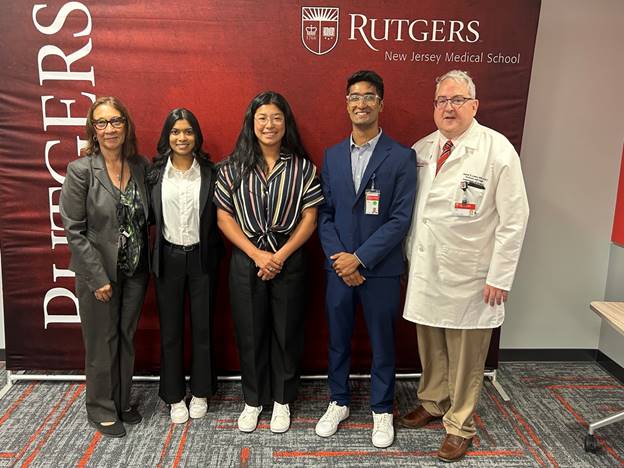
The First Annual Research Symposium Generates Excitement and Enthusiasm
Recently, Rutgers New Jersey Medical School (NJMS) hosted its first Annual Research Symposium, where students from across all four years presented their research. “We invited all classes to submit, and we selected 105 abstracts through a peer-review process,” said one of symposium organizers, Maria Soto-Greene, MD, Professor and Executive Vice Dean.
Presented on 15 wall-mounted screens, the selected posters were viewed by several hundred people throughout the day. Ten posters were selected for oral presentations with three winners chosen at the end. Besides recognition, the trio will receive travel funds to present their abstracts at national-level conferences. A student-led panel discussed challenges and joy of research, from choosing a research mentor to publishing your first manuscript. “We’re really impressed by the phenomenal scope and breadth of research our students are doing under the mentorship of faculty, residents and fellows,” Soto-Greene said.
Winner Disha Panchal assessed the effectiveness of a video helping women understand hysterectomies. “I was interested in gynecology since high school, when I would explain to my friends how the female body works,” said Panchal. "When I shadowed an OBGYN, I learned that about 70 percent of US women might develop uterine fibroids, which the most common indication for hysterectomy. Yet, few women know that." Her research showed that the video indeed helped inform women understand hysterectomies better. "This knowledge may help women make better choices whether to get one or not." She will use her travel funds to present at the American Association of Gynecologic Laparoscopists Congress later this year.
Another winner, Phoebe Li, focused on investigating whether malfunctioning dopamine pathways in mice brains can trigger food addiction, which leads to obesity—and might work in similar ways in humans. With the obesity epidemic surging, understanding whether neural dysregulation can cause an addictive state of eating needs more research, a topic she aims to keep studying. “This symposium was a great steppingstone and training for presenting at future events,” she said.
Imran Khawaja investigated how diabetic patients fared after the obstructive sleep apnea surgery. “We found that patients that were diabetic were more likely to have longer hospital stays and urinary tract infections, compared to non-diabetics,” said Khawaja whose medical interests are fueled by his father’s battle with amyotrophic lateral sclerosis, a neurodegenerative disease. Khawaja is presenting his research at the Combined Otolaryngology Spring Meetings. “I want to care for and aid patients during their times of hardship,” he said.
Daniel Jones, MD, Assistant Dean, Chair of Department of Surgery at NJMS, said the symposium was a stimulating way to share research amongst students and faculty. Research can be siloed, confined to the boundaries of specific fields, labs or classes. “If I present my surgery work at a surgery meeting, the psychiatrists never know what I'm doing,” he said. “Organizing this forum allowed us to learn what our colleagues in other departments do. Junior students learned what research their senior schoolmates were doing across all specialties. Overall, this symposium took on a much bigger role—it generated excitement, enthusiasm, and respect for what others are doing.”

